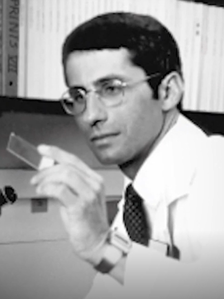
He had only been Director for the NIAID (National Institute of Allergies and Infectious Diseases) of the NIH for a few months, when he called me. This was in 1984.
I was serving as interim executive director of the Howard Brown Memorial Clinic, a woefully underfunded and understaffed basement street clinic in Chicago's boystown. I had stepped into the post when the clinic's ED became ill, and ... well ... someone had to do it. I took a leave of absence from my job as manager of education of the American Hospital Association, and went to work. It was the beginning of the AIDS epidemic. There was work to be done, homophobia to overcome, and patients to serve.
Howard Brown may have been operating on a shoestring out of a dark basement suite of offices on Chicago's Halsted Street, but it had already made a name for itself as a locus of research. The clinic had quick access to a population that mostly eluded more traditional research institutions - i.e. gay men. It's research into Hepatitis had been a key component into the development of a Hep vaccine. So when the NIH needed four cities to each recruit a thousand gay men for the first research project into the newly discovered HIV virus, the NIH turned to Howard Brown.
I was sitting at my desk just beginning my day when the phone rang. "Hi," he said. "This is Dr. Anthony Fauci from the NIH. We've got a problem." He went on to explain to me that Howard Brown's director of research, a respected Chicago doctor and researcher also affiliated with Northwestern University, was attempting to form a for-profit group of doctors in an effort to take over Howard Brown's research programs. In other words, one of Howard Brown's key employees was engaged in an effort to sabotage the work of Howard Brown for his own financial advantage. He asked what I wanted to do.
I told him I would fire this doctor and hire someone else to head the research. And that afternoon I did.
The doctor I fired had been one of Howard Brown's founders. He was widely respected and admired. I was an unknown, temporary clinic manager with one name. The situation became explosive quickly. The doctor hired attorneys who threatened to sue me and the clinic. I had to hire my own attorney to defend me against possible action. The gay press and the mainstream press in Chicago covered the brouhaha extensively. The clinic board called a community meeting attended by over 300 people to explain the firing. The board, thankfully, unanimously supported me. Many in the community did not.
I hired Dr. John Phair of Northwestern University to be our PI (Principal Investigator) for the MACS study. Dr. Phair continued as PI for 35 years, until his retirement last year. The MACS study still continues today. It has produced more than 1000 research papers and has been a crucial element in the world's efforts to stop AIDS. I am patient 20034 - the thirty-fourth study participant in the second site, Howard Brown. Every six months, for the last 36 years, I have submitted to clinical study, along with what has grown to over 7000 study participants.
In 1984, Anthony Fauci dealt with me and with Howard Brown honestly and ethically, and provided a steady hand in a crisis that could well have ended in the demise of Chicago's participation in the MACS study, and the loss of valuable research data. In intervening years, I have had no contact with him, and I can't imagine he would even remember his call to me, almost four decades ago. I have nonetheless followed his career with great interest, as he has guided our nation, and often the world, through one medical crisis after another.
Thank you Dr. Fauci, for being there for us again.
I was serving as interim executive director of the Howard Brown Memorial Clinic, a woefully underfunded and understaffed basement street clinic in Chicago's boystown. I had stepped into the post when the clinic's ED became ill, and ... well ... someone had to do it. I took a leave of absence from my job as manager of education of the American Hospital Association, and went to work. It was the beginning of the AIDS epidemic. There was work to be done, homophobia to overcome, and patients to serve.
Howard Brown may have been operating on a shoestring out of a dark basement suite of offices on Chicago's Halsted Street, but it had already made a name for itself as a locus of research. The clinic had quick access to a population that mostly eluded more traditional research institutions - i.e. gay men. It's research into Hepatitis had been a key component into the development of a Hep vaccine. So when the NIH needed four cities to each recruit a thousand gay men for the first research project into the newly discovered HIV virus, the NIH turned to Howard Brown.
I was sitting at my desk just beginning my day when the phone rang. "Hi," he said. "This is Dr. Anthony Fauci from the NIH. We've got a problem." He went on to explain to me that Howard Brown's director of research, a respected Chicago doctor and researcher also affiliated with Northwestern University, was attempting to form a for-profit group of doctors in an effort to take over Howard Brown's research programs. In other words, one of Howard Brown's key employees was engaged in an effort to sabotage the work of Howard Brown for his own financial advantage. He asked what I wanted to do.
I told him I would fire this doctor and hire someone else to head the research. And that afternoon I did.
The doctor I fired had been one of Howard Brown's founders. He was widely respected and admired. I was an unknown, temporary clinic manager with one name. The situation became explosive quickly. The doctor hired attorneys who threatened to sue me and the clinic. I had to hire my own attorney to defend me against possible action. The gay press and the mainstream press in Chicago covered the brouhaha extensively. The clinic board called a community meeting attended by over 300 people to explain the firing. The board, thankfully, unanimously supported me. Many in the community did not.
I hired Dr. John Phair of Northwestern University to be our PI (Principal Investigator) for the MACS study. Dr. Phair continued as PI for 35 years, until his retirement last year. The MACS study still continues today. It has produced more than 1000 research papers and has been a crucial element in the world's efforts to stop AIDS. I am patient 20034 - the thirty-fourth study participant in the second site, Howard Brown. Every six months, for the last 36 years, I have submitted to clinical study, along with what has grown to over 7000 study participants.
In 1984, Anthony Fauci dealt with me and with Howard Brown honestly and ethically, and provided a steady hand in a crisis that could well have ended in the demise of Chicago's participation in the MACS study, and the loss of valuable research data. In intervening years, I have had no contact with him, and I can't imagine he would even remember his call to me, almost four decades ago. I have nonetheless followed his career with great interest, as he has guided our nation, and often the world, through one medical crisis after another.
Thank you Dr. Fauci, for being there for us again.

 RSS Feed
RSS Feed